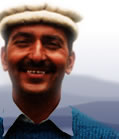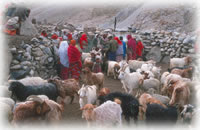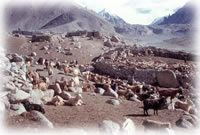 |
 |
||
 |
|||
|
RELATED THEMES agriculture environment environmental knowledge festivals OTHER LOCAL THEMES BACKGROUND |
livestock
People depended on their livestock, and to a large extent still do, for a range of products: milk, butter, cheese, meat, hide for sacks and shoes, and wool and hair for clothing and rugs. In present times the sale of livestock and their products also provides valuable income for daily necessities and school fees. However, two narrators refer to marketing difficulties now faced by the community, for example: "We face a lot of problems because when there is demand in the market our livestock remain at Pamir and when our livestock are ready for sale the demand has reduced as a lot of livestock have already been sold in the market from other areas. In this way we do not get a good price for our livestock and this is our problem… If we make some organisation and contact a contractor through some institution only then would be we successful" (Pakistan 5).
The majority of animal husbandry is performed by women, apart from taking care of the yaks throughout the year. Most of the community's yaks remain in the higher pastures all year round and are cared for by a number of male shepherds who move them between numerous pastures. Laili (Pakistan 16) is an experienced herder who has performed this difficult duty many times: "during winter it is very hard… very cold, and…the shepherds have to face so many problems… The first reason [that many of our yaks die] is lack of grass due to heavy snow falling." His interview goes on to focus entirely on his experience, knowledge and opinions as a herder. In addition to detailed descriptions of grazing patterns throughout the year, Laili has interesting views to share on the current problems relating to grazing management and the increasing yak population. He also has ideas for solutions. For example, he feels there is a need to construct more channels to encourage the growth of grass in barren areas for the increasing yak population. He also suggests that they need to kill or sell more yaks every year to ensure the sustainability of this system of production: "the production should be continued according to our limitations, like the grass in our pastures. The number of production per year is 200 yaks. So we should sell at least 100 yaks per year to get the benefit, otherwise this productivity would be useless for all of us." The remainder of Shimshal's livestock spend the winter months in the village, during which time the dung is collected and then prepared as fertiliser to spread on the fields prior to planting. In early summer the livestock are moved to the pastures where they reside for five months. Gulshad explains: "When the cultivation is completed by the end of May, half of the population migrates to the pasture along with the livestock; the responsibility and task of those people is to look after the livestock. The half of the population that remains in the village is responsible to look after the fields. The responsibility of the people in Pamir is to collect milk from the livestock and make butter and cheese out of it and also to collect the wool and the hair of the livestock and process it" (Pakistan 17). It is mainly women who kooch (migrate) ie, go to Pamir during the summer months and they are largely responsible for livestock care and the preparation of dairy products. When women first reach Pamir from the village there are a series of rituals which are performed prior to commencing regular activities: "When we reach there we perform Mirgichig (purification). Then the first product of the new season is sent to their families in the village which is consumed in a special festival with thanksgiving and prayers" (Pakistan 22). Festivals and the exchange of resources link those in the village and those in Pamir during the summer months. Grain is taken from the village up to Pamir and dairy products are brought down from Pamir. There is a "ritualised" game, Nash Qalam Din (rope-cutting mission) which takes place between the Pamiriks (those in Pamir) and the deyoriks (those from the village). A similar food-snatching mission takes place in the village! Other customs include shartwurza (guest of the year) and yak racing. The return to the village of the livestock and those who have spent the summer in Pamir has traditionally been a time of celebration. Roshan explains how in the past, when she and others returned from Pamir: "The villagers all came to meet us in a place which a bit far from the village. But now the trend has changed and people remain inside their homes" (Pakistan 21). quotes about livestock"When they reach Pamir then the same day or the next day, the most senior woman after confirming the correct position of the stars and the horoscope, begins the milking of the yaks and [other] livestock. Then each senior woman from every family starts milking the livestock of their close relatives. Three days later another custom called Mirgichig (purification custom, to give thanks to God) is performed. Then the first fresh butter is donated to the community centre in the name of God. Thereafter everyone formally begins producing dairy products from their livestock." "We derive a lot of benefits from the livestock. I will tell you in detail. From the wool we fabricate socks, coat, trousers and bett… Even today we make woollen bett and cap for the weddings of our children, which reflect the cultural heritage of this village. In our houses we use the carpets made out of yak's hair, which is very durable. We also sell these carpets in the market. We prepare butter and qurut which we use in our every day food. So almost all the necessities of life we obtain from the livestock and those who posses more livestock offer part of their livestock and butter to nomus (system of donating resources for a community project in the name of a relative) which facilitates development in the village." "…in spring when we cultivate our fields and the fields become green then we move the livestock from the village for the sake of our fields. The women accompany these livestock and live at Pamir… They stay there for about five months looking after the livestock. The dairy products vary but whatever it is they gather, all these products, they finally bring them to the village after five months of stay at Pamir. Those who live in the village, they collect and store the agricultural products during the five months and at the end, the agricultural and dairy products are combined: that constitutes the total income of a family for that year." "When grazing the livestock we used to go along with girls of the same age to make the grazing time more joyful for us… During the collection of fuelwood, we usually sang songs. While going to the shelters with our mothers we used to sing songs mostly "Noonik, noonik" (local song; noonik means sister in-law). Whenever I remember that life, I felt it was a beautiful life we spent together." "[The grazing system] was like this that everyone was together (joint family system) two (women) used to live in the village and two would go to the pasture. The two in Pamir one of them (usually the elder) called dughdor would stay at home and the other would go as shpunig (herding). The dughdor would stay at home and milk the animals, make cheese, yogurt butter, cut and manage the wool and hair. Shpuns would [rotationally] go with animals and care for them while they are grazing. I heard that nowadays shpuns do not help others. If they are asked [to do anything] they say that "yes your children are studying and so why will I work for you?" Now I heard that khoonadars (women in charge of food stocks and monitoring household expenses) themselves go as shpun." "In our times when we used to go to the pasture it used to be very difficult for us to survive during bad weather conditions. We used to bear the harsh weather and less food and wait for the harvest to come. Our sons and brothers used to bring sacks of freshly ground flour for us from the village to Pamir at the time of Chaneer (harvest festival). We also used to take care of the animals of the Mir (rulers of Hunza state up to 1974) people of the village used to work for the Mir without payment, they used to prepare the wool by spinning and weave woollen cloths, carpets and ropes etc for him." |
|
 Shimshal is the sole steward of vast areas of high altitude pasture and depends very much on transhumant livestock herding (goats, sheep, cattle and yaks) as well as agriculture.
Shimshal is the sole steward of vast areas of high altitude pasture and depends very much on transhumant livestock herding (goats, sheep, cattle and yaks) as well as agriculture. Whereas in the past livestock was a family's key source of wealth and status, today education and jobs appear to confer higher esteem. Rajab recalls:
Whereas in the past livestock was a family's key source of wealth and status, today education and jobs appear to confer higher esteem. Rajab recalls: